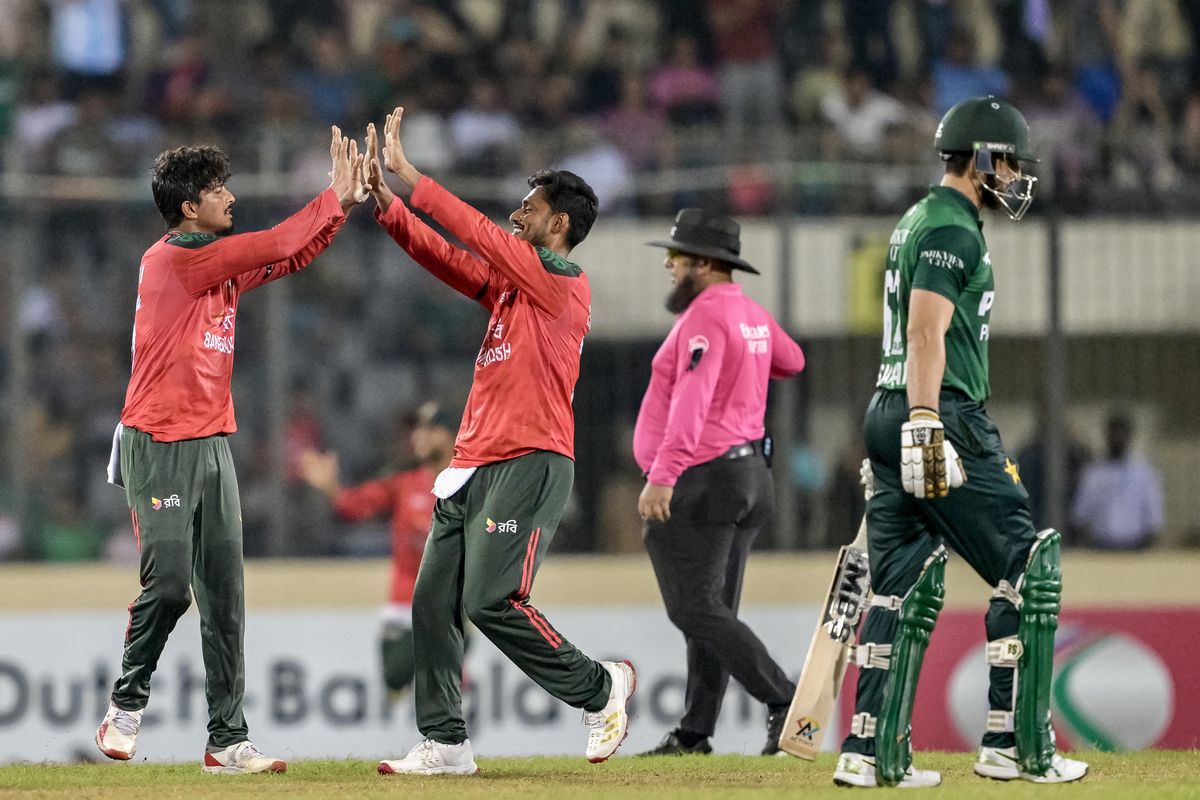Pakistan’s T20I experiment faces harsh scrutiny after Bangladesh series loss
With several senior players missing, the decision to field a youthful and untested lineup has sparked a serious debate about the direction the team is headed in

Alam Zeb Safi
Correspondent Nukta
Alam Zeb Safi is a sports journalist, having served in the capacity for 25 years. Covered so many international sports events on foreign soil also including England and Australia.

Bangladesh's Mahedi Hasan (L) celebrates with a teammate after taking the wicket of Pakistan's captain Salman Agha (R) during the second Twenty20 international cricket match between Bangladesh and Pakistan at the Sher-e-Bangla National Cricket Stadium in Dhaka on July 22, 2025.
AFP
The Pakistan cricket team is facing increasing scrutiny after a disappointing T20I series loss to Bangladesh side in Dhaka.
At the heart of the controversy is whether Pakistan’s experiment with a new playing style, implemented without a strong domestic foundation, is a wise move, especially with the Asia Cup and T20 World Cup fast approaching.
The continuous omission of key figures like Babar Azam, Mohammad Rizwan, and Shaheen Afridi has raised alarms about the consequences of sidelining experience in favor of experimentation at such a crucial time.
Former Test opener Sadiq Mohammad did not mince words while reacting to Pakistan’s lackluster performances in Dhaka.
He argued that although youngsters may occasionally produce exciting moments, it is the experienced players who are vital in dealing with pressure and challenging conditions.
“They looked completely lost, just swinging blindly at the ball,” Sadiq said in an interview with Nukta. “That’s the difference between them and top-quality players like Babar and Rizwan, who know how to handle the new ball and adjust to movement off the pitch.”
He explained that when the ball is zipping around at speeds of 85 to 90 mph, it requires split-second decisions on whether to move forward or stay back. According to him, such instincts come only with top-level experience, something Pakistan's young squad sorely lacked in this series.
Sadiq was particularly critical of the decision to rest Pakistan’s senior players.
“It’s absurd to bench players like Babar and Rizwan,” he said. “They are the backbone of our side and know how to navigate any situation.”
He warned that keeping them out for long stretches could harm their match fitness and sharpness.
“If we don’t play them for a year, they’ll lose their edge. Later, when they underperform, people will say they’ve declined—but the real responsibility will be on the PCB and the selectors,” he said.
He also emphasized the importance of earning international spots through a solid domestic system, ideally one that prepares players for global standards.
“You don’t throw kids into the deep end in international cricket. They should gain that experience at the domestic level, facing the best bowlers, on tough pitches,” he said.
“But even our domestic tracks are flat and lifeless. We need to prepare bouncier surfaces to equip our batters for conditions like those in Dhaka, where balls were bouncing to shoulder height,” he added.
Sadiq further warned against overhauling the team too rapidly. In his view, change should be gradual: “You can introduce a couple of new players, but the core should remain experienced. That’s the only way to maintain balance.”
He also called for a complete restructuring of the selection committee.
“We need fresh minds on the selection panel, people who haven’t been part of the same cycle for seven or eight years. Former cricketers with new perspectives can bring much-needed clarity and improvement in decision-making,” Sadiq said.
Sadiq concluded by urging the management to focus less on short-term rankings and more on long-term consistency.
“Our goal should be to stay among the top five teams in the world in all formats. If we keep following this flawed path, we’ll only damage our own cricket in the long run,” he concluded.










Comments
See what people are discussing